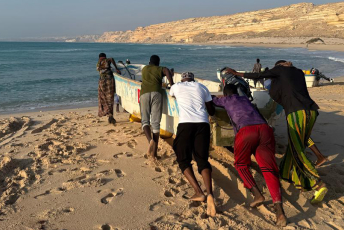The most trafficked species in the world is the pangolin: a medium-sized, ant-eating mammal that is covered in scales. According to wildlife conservation NGO, TRAFFIC, an estimated 1 million pangolins were poached globally between 2000 and 2013. In May 2019, 5.3 tonnes of pangolin scales were seized in Vietnam in a shipment from Nigeria, signalling the unabated trade in the species.
Pangolins are targeted for their meat, skin and scales. Their meat is considered a delicacy predominantly in Asian countries, while their scales are used in traditional Chinese medicine, stemming from the belief that they cure illnesses. Their skin is usually processed into leather products.
The mammal is one of the world's most protected species, listed on the IUCN Red List of Threatened Species and Appendix 1 of the Convention on International Trade in Endangered Species of Wild Fauna and Flora (CITES). Yet this has had little impact on the illegal trafficking of the species. Prince William, the Duke of Cambridge, recently highlighted the plight of the pangolin and pledged his support towards saving the species.
There are eight species of pangolins, four of which are found in Asia. Four other species occur in Africa, namely the giant pangolin, Temminck’s ground pangolin, black-bellied pangolin and white-bellied pangolin.
The ground pangolin is the only species of pangolin native to most Southern African countries. Its range extends to Rwanda, Kenya and even Chad. Pangolin trafficking in Southern Africa is not as big as in other parts of Africa. However, Prof Ray Jansen, who chairs the African Pangolin Working Group, told ENACT that unless measures are put in place, the ground pangolin will face extinction in the next two decades.
One of the measures to address wildlife crime is by reducing demand through awareness-raising programmes conducted by government and civil society in destination countries, as well as countries of origin. The aim is to educate people about the impact of trafficking and thereby reduce demand.
However, with regard to pangolins, there seems to be little success in mitigating the problem. When it comes to demand reduction in destination countries, one question is pertinent: how is it possible to change people’s belief that pangolin's scales and meat have healing powers?
For this reason, demand-reduction programmes also focus on people in the countries of origin. In designing such awareness-raising programmes, it is important to leverage traditional beliefs that promote the pangolin.
For instance, a senior law enforcement official from Mozambique dealing with wildlife crime told ENACT that the pangolin is revered in Mozambique, often referred to as ‘the rainmaker’. It is believed that killing a pangolin brings bad luck to people who kill the animal and their families. This belief is also prevalent in certain parts of South Africa.
While not every country or culture may share similar beliefs, where they do exist it would be worthwhile to incorporate these into the design of demand-reduction programmes. In other words, these would be traditional ‘custom-fit’ demand-reduction strategies that could be understood and community owned.
It would be naïve to assume that such traditions alone are enough to address the problem. The financial benefit that can be derived from pangolins – alive or dead – due to growing demand in Asia, is too great an incentive for organised criminals. To this end, profit will always triumph.
Conservationist Rob Bruyns, who has researched the use of pangolins in traditional medicine in Africa, notes that traditional practice is not the primary cause behind the decimation of the pangolins but rather the commodification of the species. The number of pangolins poached or captured by traditional healers is small in comparison to those trafficked by transnational organised criminals. However, Prof. Jansen warns that while this may be the case, one should not become too complacent in this regard.
As mentioned above, demand reduction is one of the measures used to address wildlife trafficking. Targeting criminal syndicates – rather than focusing on poachers, who are at the bottom of the criminal value chain – is another. Since wildlife crime is typically regarded as a low-risk crime, strengthening legislation and creating more stringent penalties is another measure that is often advocated by wildlife organisations.
Reinforcing entry and exit points is also key in addressing wildlife crimes, as these are the primary points by which illegally obtained products leave the country of origin and arrive in the destination country.
The traditional aspect is often missing in the strategies and plans designed to address wildlife crimes. Law enforcement tends to focus on policing methods that are aimed at producing results. These include determining the modus operandi of the criminal, following the money trail, targeting sellers, etc. At times, demand-reduction programmes implemented by wildlife and conservation organisations use generic frameworks that are not contextualised in the settings within which they operate. The result is that little progress made in dealing with the problem of wildlife trafficking.
Experts emphasise that promoting local ownership within the communities where the species is found is critical in combatting wildlife trafficking. Drawing on traditional beliefs in the design of demand-reduction programmes could contribute greatly to local ownership.
Until now, combatting pangolin trafficking has slowly begun to yield results, exemplified in seizures of pangolin scales and the successful arrest and prosecution of traffickers. Given the light sentences given to traffickers and the demand in Asia, pangolin trafficking is becoming more profitable and less dangerous than rhino or elephant poaching.
Tradition may not be the panacea to resolving pangolin trafficking, but should be used in conjunction with other measures illustrated above. With the current initiatives yielding slow results, it is no doubt worth a try. Who knows, tradition could be the key to the pangolin’s survival.
Richard Chelin, Researcher, ENACT project, ISS







